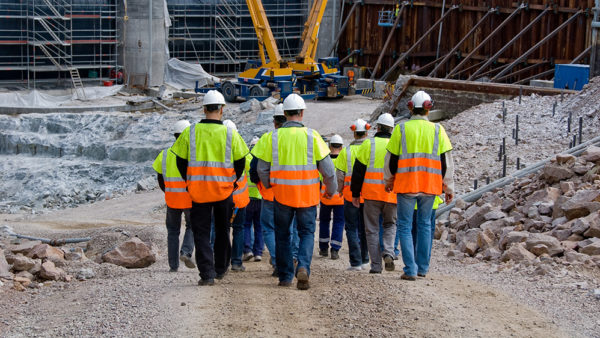Chrissi McCarthy MCIOB says it’s time to examine the all-male CMYA awards – to better serve women and their careers, men who feel they have to ‘toughen up’ and an industry with an image problem.
When I worked in construction I had an ambition – well I had a lot of ambitions and still do – but there was one with a particular focus. I wanted to win the CIOB’s Construction Manager of the Year Awards (CMYA): for me they were the only awards that showcased the best of the talent in the industry. I felt if I ever won an award it would show that I had achieved something that was very important to me – that I was the best I could be at my job.
The awards played another part in my career. When I decided to leave site management as a profession to focus on how to change the sector to make it better for the people within it, I did one last thing before I closed the door just to check I wasn’t making a terrible mistake – one last thing before I left behind a career that had been an important part of my identity for about 15 years. I looked up.
I looked at CEOs, industry presidents and, of course probably most important, the CMYA finalists. I looked up to see if there were any women there – to see if women could make it if we only tried hard enough.
What I saw confirmed my worst fears. Women were not present at the top of the industry.
This was in 2007, though, and things have changed. My ambition is now to gain a PhD, help the industry improve and grow a successful business. RICS, RIBA, CIOB, ICE and IStructE have all had their first female presidents, Laing O’Rourke and Mitie both have female CEOs and CITB appointed its first female board member.
Some things have changed for the worse. The number of women in the industry has fallen from 13% down to 11% and the CMYA 2014 had no female nominations out of 95 finalists – and nowhere on the website http://www.cmya.co.uk/ does it even raise the issue.
Why does this matter?
Women in construction aren’t daft. In fact, on average women in the sector are bright and ambitious. That’s usually because we haven’t “fallen” into the industry, rather we have worked hard to work to find our place here (if you fell in, had an easy time and are a woman, good for you and long may it continue).
But the problem is that our industry asks a lot of site managers – a hell of a lot more than most industries: averages of 60-hour weeks, dangerous environments and not as much respect as we deserve. If we don’t give the bright, ambitious people real opportunities for promotion and progression they might start to think it’s not worth the hassle, no matter how much they love the job. And they might do as I did – check to see if anyone else made it before making the decision to close the door.
“What do we think is the message we send to our young entrants about the industry when we say ‘this is the best our industry has to offer’ and there is not a single woman in sight?”
The men aren’t daft either. Increasingly the men I talk to in the industry worry about how valued their soft skills are. Many tell me that they feel they have to “toughen up” their approach even where they feel this is detrimental to the job. As one remarked to me earlier this month, it says a lot if women who are renowned for their soft skills don’t even get a look in – what does that say about what we value in construction?
Or the young folk. I don’t need to point out that the industry has an image problem, or that a lot of the things associated with this problem are linked to macho stereotypes. What, then, do we think is the message we send to our young entrants about the industry when we say “this is the best our industry has to offer” and there is not a single woman in sight?
Or our clients. It just cannot look good to be one of the only industry awards to be so very male dominated – how do we change an image that we insist on reinforcing?
But we might all be. We need to really address these issues. We can’t keep waiting for things to improve, because they haven’t – not in the last 30 years. If we want improvement we need a strategic plan that understands gender, wider equalities, the construction sector at large and the real experience of working on site. Anything without this breadth of knowledge is likely to fall by the wayside.
CIOB, this is a “call to action” – as a female member, I wish I had had your support way back when, but more important, I want female members in the industry to have it now. So please start now to put something in place that understands and caters to your full membership. Mainstream your processes so they are not gender biased, put in place programmes to help the brightest make it to the top and take time to consider your own bias and presumptions.
I’m not saying the CIOB is the worst offender or that everyone else has their house in order, but I am saying that due to the project-based nature of work in the construction industry, the male dominance in the CIOB-related areas and the prevalence of the “old boys club” style of promotion and recognition, there is currently a gender bias towards men in industry and the CIOB needs to take responsibility for the part it plays in this.
It isn’t just that there were no female finalists in the CMYA 2014, there were no female nominations – not one. Whilst our membership of women is maybe small, at 3.41%, it still should have been representative – we should have seen 3.5 women if the system was fair. Even if you only went off the data for fellows alone, there should have been 1.7 % representation from women within the nominees.
I need to be very clear that I am not talking about giving women credit where it is not due – I am talking about not giving credit where it is. I do not want to see women tokenistically appreciated – I want to see women rewarded for their hard work at the same proportional rate as their male peers, alongside their male peers. This is not happening.
I believe it is incumbent upon the CIOB to reconsider its practices. If it does, I think you’ll find we will all become winners.
Chrissi McCarthy MCIOB is managing director of Constructing Equality http://constructingequality.co.uk/











Comments are closed.